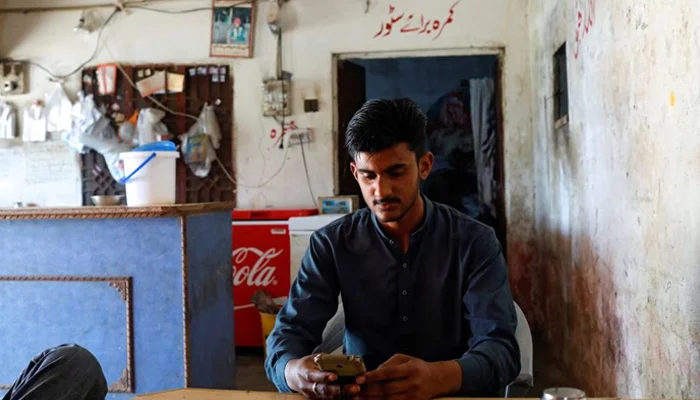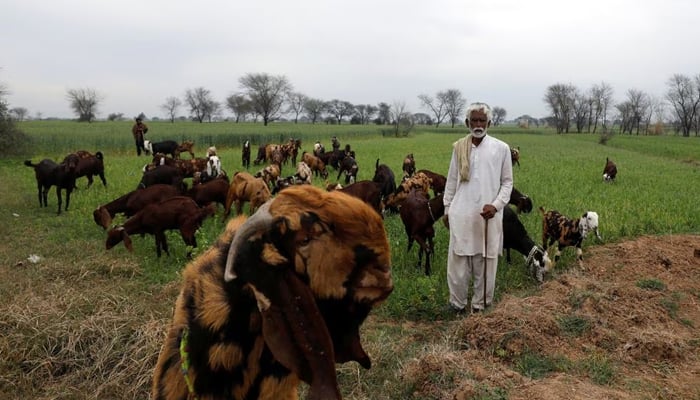Pakistanis risk lives to reach Europe due to economic meltdown

A family member shows a mobile phone with a picture of Muhammad Nadeem, 38, father of three sons, who died along with others when a migrant boat shipwrecked off the coast near Benghazi in Libya, outside his home in Hariyawala town in Gujrat district of Punjab province, Pakistan on March 3, 2023. The Reuters news agency
The economic crisis has led to an increase in Pakistanis making illegal journeys.
As a result of depreciating currency and deficits, government took drastic measures.
Pakistan’s borders were breached by 401 people in January 2023 through April 2023.
After working in Saudi Arabia for two decades, Hameed Iqbal Bhatti returned to Pakistan three years ago in desperate need of assistance.
He closed his restaurant business due to the pandemic’s effects on the economy.
He cobbled together $7,600 for a trafficker to smuggle him into Europe, where he hoped to rebuild his life, his brother Muhammad Sarwar Bhatti, 53, told Reuters.
At the family home in Azad Jammu Kashmir (AJK), the elder Bhatti said he would start over for his children’s future.
The boat that left Libya carrying the younger Bhatti, along with hundreds of others, sank off Greece last week, killing hundreds of migrants.

At a tea stall in Bhojpur town, Gujrat district of Punjab province, Pakistan, March 7, 2023, Suleman Asim, 18, friend of Muhammad Ali, 21, who died with other migrants when a boat shipwrecked near Benghazi in Libya, looks at pictures of his friend on a mobile phone. The Associated Press
According to his brother, he was missing and presumed dead, illustrating the dangers people who attempt to enter Europe illegally face.
According to Reuters, more than a dozen migrants and their relatives, as well as experts and data, Pakistanis have been making these journeys in increasing numbers in recent months.
There is a record 38% inflation rate in Pakistan’s $350 billion economy, which is cash-strapped.
Over the past year, the government adopted drastic measures to avoid default due to a rapidly depreciating currency and external deficit.
However, this resulted in a huge drop in growth and employment. Pakistan’s industrial sector, which is its economic engine, contracted almost 3% in the current financial year, troubling for a nation of 230 million with more than 2 million new entrants each year.
In the last two years, there have been no official unemployment statistics released. A former finance minister and economist renowned for his work on Pakistan’s labor force, Hafeez Pasha, estimates the unemployment rate at “11-12%, conservatively”.
Reuters asked the Pakistani information ministry why migration is fueled by economic factors, but it didn’t respond.
The edge of the cliff
During January to May, Frontex, the EU’s border and coast guard agency, detected 102,000 irregular migrants at the external border of the bloc, 12% more than the previous year.
During the past few years, crossings of the central Mediterranean via Libya, mainly to Italy and Greece, have nearly doubled, accounting for about half of the total. A Frontex spokesperson told Reuters that Pakistanis are the third nationality registered in Italy after Egyptians and Bangladeshis.
The Frontex data show that 4,971 of the detections this year through May came from Pakistan, a record number for the country on the central Mediterranean route in a single year.

After the funeral of his son, Dalawar Khan (C), the father of Muhammad Ali, 21, who died with others when a migrant boat shipwrecked in Libya near Benghazi, sits with people who came to attend a prayer at his family home in Bhojpur town in Gujrat district of Punjab province, Pakistan.
Following the latest boat disaster, Pakistan observed a day of mourning on Monday.
According to official data based on information provided by relatives, at least 209 Pakistanis were on board.
There had already been numerous Pakistani deaths in the Mediterranean this year before last week’s sinking.
Muhammad Nadeem, 38, was aboard a boat that sank off Libya in February, killing more than 70 people.
He supported his sister and mother as well as his three children and had three children of his own.
Kosar Bibi, his mother, said that his wages were modest and rising inflation had made their situation precarious.
It used to be we could make ends meet, and he could feed his family. But it had become impossible”, she told Reuters in their cramped three-room house.
She said her son paid a friend to arrange his trip to Italy through Libya.
According to Bibi, her husband told her, “Mother, our conditions will improve. He told me he would get his sister married and send me to Hajj.”.
The vast majority of those who make the journey are unskilled or labourers, and they have difficulty obtaining work visas, according to Pakistan’s Federal Investigation Agency (FIA).
The Pakistan rupee has depreciated 35% against the euro and dollar in the past 18 months, making it more appealing for them to live frugally in Europe and send money home.
Sarwar Warraich, an FIA official based in Gujarat, told reporters that people believe foreign currency is going up in value, so whatever they earn will multiply when they send it back.
Working abroad is a tempting prospect
It was only a matter of looking around his own neighborhood for Nadeem to discover what Europe had to offer.
Seeing his friends and neighbors succeed, Nadeem hoped that God would make him successful too, said Muhammad Zubair, Nadeem’s cousin.
Nadeem’s home is a few km from Muhammad Nazim’s vacation home in Gujrat, where Reuters visited in the spring. According to Nazim, 54, he lives in the Italian city of Ferrara and runs a construction business there.
We build our houses (in Italy) too, but we come here after a year or two to relax and spend a few months with our children,” said Nazim.
Every household in Gujrat has at least one person living abroad, whether in Europe or the Middle East.”
According to Nazim, who entered Europe illegally via Turkey in the 1990s and eventually obtained residency, he understood why people left Pakistan.
